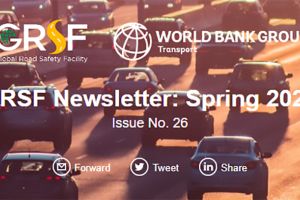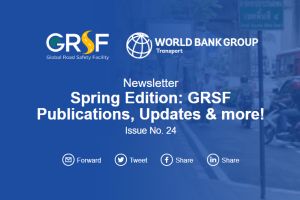Reducing road deaths and injuries with the new World Bank–Bloomberg Philanthropies partnership
September 25, 2020

A man walks down a busy road in Kampala, Uganda. Photo: Sarah Farhat/World Bank
Every year, road crashes claim the lives of 1.35 million people, and leave another 50 million seriously injured. The majority of victims are part of the working-age population (between 15 and 64 years old). In fact, road crashes have become the #1 killer of the young worldwide. Importantly, 93% of all road fatalities occur in low and middle-income countries (LMICs).
This tragic loss from a road crash death or severe injury is compounded by the harm to families, social networks, and national economies – a report released by the World Bank’s GRSF found that reducing road traffic deaths and injuries by half could add 7-22% to GDP per capita in 5 selected LMICs over the next 24 years.
In a bid to help address the road safety crisis in developing countries, the World Bank’s Global Road Safety Facility (GRSF) has been partnering with Bloomberg Philanthropies and another nine international partners under the Bloomberg Philanthropies Initiative for Global Road Safety (BIGRS). Launched in 2009, the initiative has implemented three successive programs: the Road Safety in Ten Countries (RS10) program, the BIGRS 2015-2019 and, most recently, the new BIGRS 2020-2025.
As a member of the BIGRS initiative, GRSF plays a key role in supporting government’s efforts to adopt safer road designs and improve existing road networks to accommodate all road users. Activities led by GRSF under the BIGRS program include conducting assessments of high-risk roads, providing recommendations for safety improvements, providing technical guidance on speed management, and supporting governments to adopt crash data management systems.
The new phase of this impactful partnership focuses on activities in three core areas:
Speed Management
Speed is one of the main risk factors in road crashes. As the new host of BIGRS’s Speed Management Hub, the GRSF team provides evidence-based road safety knowledge to help manage speed through infrastructure interventions and effective enforcement. Key engagements from this focus area include:
- Providing technical expertise to program partners, countries and cities, on speed management;
- Preparation and publication of Global Speed Management Guidelines in coordination with the World Resources Institute (WRI) and co-funded by UK Aid;
- Research analysis on the economics and benefits of speed management;
- Technical analysis for road engineering solutions promoting speed management.
Road Infrastructure Safety Assessments
In the 15 countries covered by BIRGS, the GRSF is working closely with World Bank teams to optimize the safety outcomes of their road projects. That involves, in particular, conducting complete assessments of high-risk roads and supporting the implementation of concrete measures to enhance the safety of the road infrastructure. Major engagements include:
- National-level road safety surveys and assessments;
- Leveraging Bloomberg-supported safety assessments to support World Bank-financed projects;
- Providing technical capacity-building workshops and learning events. To date, 688 professionals from 53 countries have been trained under the new GRSF-BIGRS partnership.
Data Management
Better data is a critical step toward improving road safety management. That’s why GRSF has been working with countries to collect, manage and analyze crash data more effectively through the Data for Road Incident Visualization, Evaluation and Reporting (DRIVER) open-source system. In this new phase of the BIGRS, GRSF will be delivering in-depth analytical work on crash data management. In particular, the team will use the DRIVER system to better track crash incidents and measure the benefits of interventions like infrastructure improvements or speed management. Major engagements include:
- Continuing to pilot DRIVER in interested cities and countries;
- Deployment of new crash database systems;
- Review of existing crash data management practices.
Engaging with countries to save lives
The following 15 countries were selected to be part of this new phase of the BIGRS program and receive GRSF support for national-level activities, including policy implementation initiatives, crash data management, and road infrastructure safety assessments: Argentina, Bangladesh, Brazil, China, Colombia, Ecuador, Ethiopia, Ghana, India, Malaysia, Mexico, Philippines, Tanzania, Uganda, Vietnam.

Since 2007, the BIGRS initiative has saved an estimated 312,000 lives and prevented up to 11.5 million injuries. Under the new 2020-2025 phase, Bloomberg Philanthropies announced a doubling of its support for global road safety, committing another $240 million to save 600,000 more lives and prevent up to 22 million injuries in LMICs around the world.
Partnerships are key for saving lives on the road!


